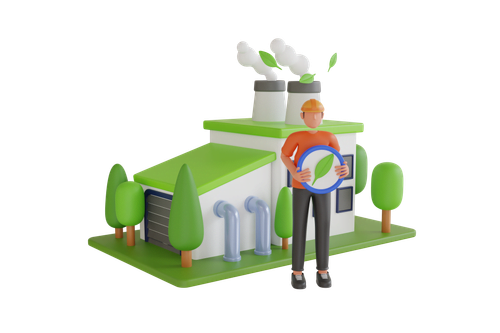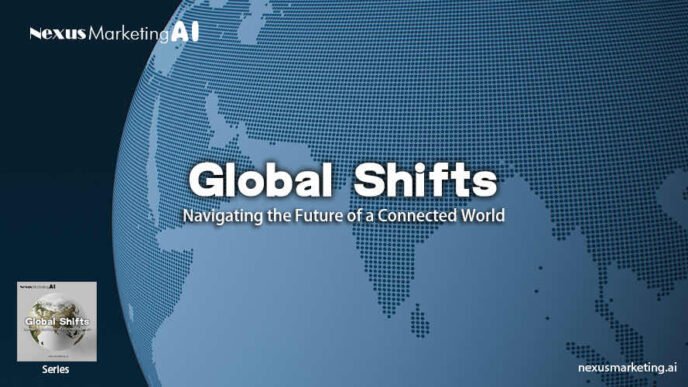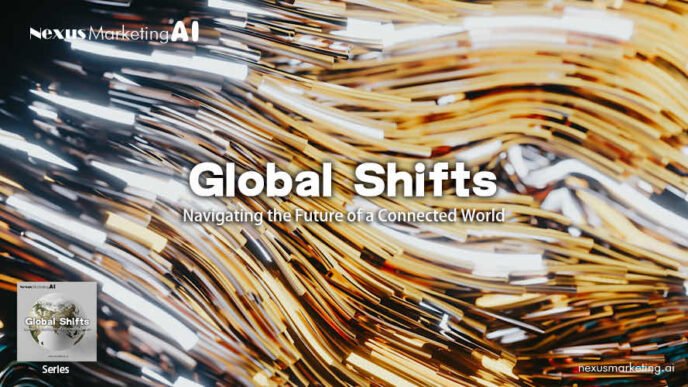Discover the evolution and impact of sustainable business practices, and how they are shaping a greener future for global industries.
Table of Contents

Prefer to listen? Enjoy the audio version of this article
Curated audio version | Audio powered by AI
Introduction to Sustainable Business: Navigating Responsibility in a Changing World

Introduction:
In today’s interconnected and rapidly changing world, businesses are facing unprecedented challenges and opportunities. As globalization accelerates and the impacts of climate change become increasingly apparent, the concept of sustainable business has emerged as not just a trend, but a necessity for long-term success.

What is Sustainable Business?
Defining Sustainable Business: Balancing Profitability with Environmental and Social Responsibility
A sustainable business is one that operates in a manner that ensures its long-term viability while minimizing its negative impact on the environment, society, and economy. This means going beyond profit margins to incorporate environmental stewardship, social responsibility, and ethical governance into the core of business operations.

The Importance of Sustainable Business
Why Sustainable Business Practices Matter in the 21st Century
Sustainable business practices are crucial in addressing the challenges of the 21st century. They allow companies to reduce their carbon footprint, conserve resources, and contribute positively to the communities in which they operate. Moreover, with consumers increasingly favoring brands that align with their values, businesses that prioritize sustainability are often rewarded with greater customer loyalty and stronger market positions.

The Necessity of Sustainability in a Globalized, Warming World
The Role of Sustainable Business in Addressing Climate Change and Globalization Challenges
In the context of globalization and climate change, businesses cannot afford to ignore their role in shaping a sustainable future. Globalization has expanded markets and created new opportunities, but it has also intensified competition and environmental strain. As natural resources become scarcer and regulations tighten, companies that fail to adopt sustainable practices risk falling behind.
Moreover, the increasing awareness of climate change means that stakeholders—from investors to consumers—are demanding more accountability. Businesses are expected to take responsibility not just for their profits, but also for their environmental and social impacts. This shift in expectations is driving a new era of corporate responsibility, where sustainability is at the forefront of strategic decision-making.
Conclusion
In conclusion, sustainable business is more than a buzzword—it’s a critical approach to ensuring that companies can thrive in the long run. By embracing sustainability, businesses can mitigate risks, capitalize on new opportunities, and play a pivotal role in creating a better world for future generations.
The Triple Bottom Line: Core Principles of Sustainable Business Success

1. Resource Efficiency in Sustainable Business: Doing More with Less
In the realm of sustainable business, resource efficiency is a critical principle that emphasizes the importance of maximizing outputs while minimizing inputs. By optimizing resource use, companies can significantly reduce their environmental impact while also cutting costs—a win-win situation for both business and the planet.

Maximizing Resource Efficiency in Sustainable Business Operations
• Energy Efficiency: Implementing energy-efficient practices, such as using renewable energy sources or upgrading to energy-saving equipment, allows businesses to lower their carbon footprint while also reducing operational costs.
• Waste Minimization: Adopting strategies to minimize waste, such as recycling programs, circular economy models, or lean manufacturing techniques, helps companies make the most of available resources and reduces the strain on landfills.
• Water Conservation: In sectors like agriculture and manufacturing, where water usage is high, optimizing water use through smart irrigation systems or water recycling can make a substantial difference in sustainability efforts.
2. Social Responsibility: The Human Side of Sustainable Business

Social responsibility is another cornerstone of sustainable business practices, focusing on the well-being of employees, communities, and society at large. Companies that prioritize social responsibility often find that these efforts lead to a more engaged workforce, stronger community relations, and a more positive brand image.

Integrating Social Responsibility into Sustainable Business Models
• Employee Well-being: Companies that invest in their employees’ health, safety, and professional development not only foster a positive work environment but also enhance productivity and retention. Offering benefits like wellness programs, flexible working hours, and continuous learning opportunities demonstrates a commitment to social sustainability.
• Community Engagement: Supporting local communities through initiatives such as charity work, local sourcing, or educational programs helps businesses build stronger relationships with the areas in which they operate. This not only contributes to societal well-being but also strengthens the company’s reputation and customer loyalty.
• Ethical Governance: Ensuring that business practices are fair, transparent, and ethical is essential to maintaining trust with stakeholders. This includes adhering to labor laws, promoting diversity and inclusion, and practicing responsible sourcing.
3. Minimizing Environmental Impact: Key Strategies for Sustainable Business

The third pillar of sustainable business is minimizing environmental impact. As the world grapples with climate change, businesses must take active steps to reduce their carbon emissions, manage waste responsibly, and adopt environmentally friendly technologies.

Reducing Environmental Impact through Green Technologies and Practices
• Carbon Emission Reduction: Businesses can reduce their carbon footprint by adopting cleaner production methods, using low-emission vehicles, and offsetting carbon emissions through initiatives like reforestation or investing in renewable energy projects.
• Waste Management: Implementing robust waste management strategies, such as composting, recycling, and reducing single-use plastics, can significantly decrease the environmental harm caused by business operations.
• Green Technologies: Investing in green technologies—such as solar power, energy-efficient buildings, or sustainable materials—helps businesses not only comply with environmental regulations but also position themselves as leaders in sustainability.
Conclusion
By embracing the principles of resource efficiency, social responsibility, and environmental impact minimization, businesses can build a robust framework for sustainable success. These core principles not only ensure the long-term viability of the business but also contribute to a healthier planet and more equitable society.
Harnessing Big Data for Sustainable Business Growth

1. Data-Driven Decisions: The Power of Insight in Sustainable Business
In the modern business landscape, data-driven decision-making is transforming how companies approach sustainability. By leveraging big data, businesses can gain deeper insights into their operations, supply chains, and environmental impact, enabling them to make more informed and effective decisions.

Using Big Data to Drive Sustainability in Business Operations
• Sustainability Assessment: Big data allows businesses to measure and evaluate their sustainability performance in real-time. This can include tracking carbon emissions, monitoring resource consumption, and assessing waste production across different departments or locations. With accurate data at their fingertips, companies can identify areas for improvement and make adjustments to align with sustainability goals.
• Decision Support Systems: Advanced analytics and decision support systems utilize big data to provide actionable insights that guide sustainability initiatives. For instance, a company might use data to determine the most energy-efficient transportation routes, optimize inventory levels to reduce waste, or identify suppliers with the lowest environmental impact. By grounding decisions in data, businesses can ensure their sustainability strategies are both effective and economically viable.
2. Predictive Analytics and Optimization in Sustainable Business
Predictive analytics and optimization technologies are at the forefront of sustainable business practices, enabling companies to anticipate challenges, optimize resources, and minimize their environmental footprint.

How Predictive Analytics Enhances Resource Management and Sustainability
• Resource Management: Predictive analytics can forecast future resource needs based on historical data, helping businesses to plan and allocate resources more efficiently. For example, in manufacturing, predictive models can predict when equipment is likely to fail, allowing for timely maintenance that prevents waste and downtime. In agriculture, these tools can optimize water and fertilizer usage, reducing environmental impact while maximizing yields.
• Energy Optimization: Energy consumption is a major factor in a company’s environmental footprint. By using big data and predictive analytics, businesses can monitor energy usage patterns and identify opportunities for optimization. For instance, smart grids and energy management systems can adjust power usage in real-time based on demand forecasts, reducing energy waste and lowering costs.
• Supply Chain Optimization: Big data also plays a crucial role in optimizing supply chains for sustainability. Predictive analytics can help companies anticipate disruptions, such as extreme weather events or geopolitical issues, and adjust their supply chains accordingly. This not only ensures continuity of operations but also minimizes the environmental impact of sourcing and transportation.
Conclusion
The integration of big data into sustainable business practices is not just a trend; it is a powerful tool that enables companies to make smarter decisions, anticipate future needs, and optimize their operations for a more sustainable future. By embracing data-driven strategies, businesses can achieve their sustainability goals while also improving efficiency and competitiveness in the marketplace.
Global Success Stories in Sustainable Business: Leading by Example

Introduction:
As businesses across the globe grapple with the challenges of sustainability, some have risen above the rest, setting new standards for what it means to be a responsible and forward-thinking company. These organizations have not only embraced sustainability as a core principle but have also demonstrated that sustainable practices can drive significant business growth. In this section, we will explore three such companies—Unilever, Patagonia, and Tesla—each of which has made remarkable strides in integrating sustainability into their operations.
Case Study 1: Unilever’s Sustainable Supply Chain Management

How Unilever Leads in Sustainable Business through Supply Chain Innovation
Unilever, one of the world’s leading consumer goods companies, has long been recognized for its commitment to sustainability. Central to this commitment is its focus on sustainable supply chain management—a strategy that has not only enhanced its brand reputation but also driven business growth.

Sustainable Sourcing Practices
Unilever’s approach to sustainable supply chain management begins with responsible sourcing. The company has committed to sourcing 100% of its agricultural raw materials sustainably. This includes ensuring that suppliers adhere to strict environmental and social standards, such as minimizing deforestation, promoting biodiversity, and supporting fair labor practices.
- Tea and Palm Oil: Unilever, a major buyer of tea and palm oil, has implemented sustainable sourcing programs that ensure these commodities are produced in ways that protect ecosystems and improve the livelihoods of farmers. For instance, its Lipton tea brand sources from Rainforest Alliance Certified farms, which adhere to rigorous environmental and social criteria.

Supply Chain Transparency
Transparency is a cornerstone of Unilever’s sustainable supply chain. The company has invested in technologies and partnerships that enhance the traceability of its raw materials. By tracking the journey of products from farm to shelf, Unilever can ensure that its sustainability standards are being met at every stage of the supply chain.
- Blockchain Technology: Unilever has explored the use of blockchain technology to improve transparency in its supply chain. This technology allows the company to trace the origins of its products with greater accuracy, ensuring that they are produced sustainably and ethically.

Collaborative Partnerships
Unilever’s success in sustainable supply chain management is also due to its collaborative approach. The company works closely with suppliers, NGOs, and governments to drive sustainability initiatives. These partnerships are vital in achieving scale and impact across its vast supply chain network.
- The Sustainable Agriculture Code: Unilever has developed a comprehensive Sustainable Agriculture Code, which sets out the company’s expectations for sustainable farming practices. This code is shared with suppliers and partners, helping to align their operations with Unilever’s sustainability goals.

Business Impact
Unilever’s commitment to sustainable supply chain management has had a positive impact on its business. By reducing waste, improving resource efficiency, and ensuring ethical practices, Unilever has not only minimized risks but also enhanced its brand equity. Consumers are increasingly favoring products that align with their values, and Unilever’s sustainability credentials have helped it capture this growing market segment.
- Growth Through Sustainability: Unilever’s sustainable brands, such as Dove, Knorr, and Ben & Jerry’s, have outperformed the company’s other brands in terms of growth. These brands are key drivers of Unilever’s business, demonstrating that sustainability and profitability can go hand in hand.
Case Study 2: Patagonia’s Commitment to Environmental Responsibility
Patagonia’s Role as a Pioneer in Sustainable Business and Environmental Activism
Patagonia, an American outdoor clothing company, has built its brand on a foundation of environmental responsibility. Known for its strong environmental ethos, Patagonia has successfully integrated sustainability into every aspect of its business, from product design to corporate activism.

Environmental Policies and Initiatives
Patagonia’s commitment to sustainability is evident in its rigorous environmental policies and initiatives. The company has set ambitious goals to reduce its environmental footprint, including minimizing waste, conserving resources, and supporting renewable energy.
- 1% for the Planet: Patagonia co-founded the 1% for the Planet initiative, pledging to donate 1% of its sales to environmental causes. This commitment has led to millions of dollars being invested in grassroots environmental organizations that work to protect the planet.
- Carbon Neutrality: Patagonia aims to become carbon neutral by 2025. To achieve this, the company has invested in renewable energy, improved energy efficiency in its operations, and offset its remaining emissions through various initiatives, such as reforestation projects.

Sustainable Product Design
At the heart of Patagonia’s business model is the belief that products should be durable, repairable, and environmentally friendly. This philosophy is reflected in the company’s approach to product design and manufacturing.
- Worn Wear Program: Patagonia encourages customers to buy less by offering high-quality, long-lasting products. The Worn Wear program allows customers to trade in used Patagonia gear for store credit, which is then refurbished and resold. This initiative promotes the concept of a circular economy and reduces the demand for new products.
- Recycled Materials: Patagonia has pioneered the use of recycled materials in its products. For example, the company’s popular Synchilla fleece is made from recycled plastic bottles, reducing the need for virgin materials and lowering the environmental impact of production.

Corporate Activism and Advocacy
Patagonia is also known for its outspoken corporate activism, using its platform to advocate for environmental protection and sustainability.
- “Don’t Buy This Jacket” Campaign: In 2011, Patagonia launched a bold advertising campaign that encouraged customers not to buy its products unless they really needed them. The ad highlighted the environmental cost of consumerism and urged customers to think twice before making a purchase, reinforcing Patagonia’s commitment to sustainability over profit.
- Lawsuits and Policy Advocacy: Patagonia has taken legal action against government policies that threaten the environment, such as suing the Trump administration over the reduction of protected lands in the Bears Ears National Monument. The company also advocates for stronger environmental regulations and encourages other businesses to do the same.

Business Impact
Patagonia’s unwavering commitment to environmental responsibility has not only resonated with consumers but has also driven business success. The company has cultivated a loyal customer base that values its ethical stance and is willing to pay a premium for its products.
- Brand Loyalty and Growth: Patagonia’s strong environmental stance has helped it build a passionate community of customers who share its values. This brand loyalty has translated into robust sales growth, even during economic downturns, proving that sustainability can be a key driver of business success.
Case Study 3: Tesla’s Green Innovation and Sustainable Business Model

Tesla’s Impact on Sustainable Business through Electric Vehicles and Clean Energy
Tesla, the electric vehicle (EV) and clean energy company, has revolutionized the automotive industry and set a new standard for sustainable innovation. Through its relentless focus on reducing the world’s reliance on fossil fuels, Tesla has established itself as a leader in sustainable business practices.

Electric Vehicles and Sustainable Transportation
Tesla’s core mission is to accelerate the world’s transition to sustainable energy, and it has done so primarily through the production of electric vehicles (EVs). Unlike traditional gasoline-powered cars, Tesla’s EVs produce zero emissions, significantly reducing the environmental impact of personal transportation.
- Model S, Model 3, Model X, and Model Y: Tesla’s lineup of electric vehicles offers a range of options for consumers, from luxury sedans to family SUVs. These vehicles are not only environmentally friendly but also deliver high performance, making sustainable transportation appealing to a broader audience.
- Battery Innovation: A key component of Tesla’s success is its innovation in battery technology. The company’s advancements in lithium-ion batteries have not only extended the range of its vehicles but also made EVs more affordable and accessible to the mass market. Tesla’s Gigafactories, which produce batteries at scale, are a critical part of its strategy to reduce costs and drive widespread adoption of EVs.

Solar Energy and Energy Storage Solutions
Beyond electric vehicles, Tesla has expanded its impact on sustainability through its solar energy and energy storage products. These innovations support the company’s broader goal of reducing global dependence on fossil fuels.
- Solar Roof and Solar Panels: Tesla’s Solar Roof and traditional solar panels allow homeowners and businesses to harness renewable energy directly from the sun. These products are designed to seamlessly integrate with Tesla’s energy storage solutions, providing a complete sustainable energy ecosystem.
- Powerwall and Powerpack: Tesla’s energy storage solutions, the Powerwall for residential use and the Powerpack for commercial and utility-scale applications, store excess solar energy for use when the sun isn’t shining. This technology not only provides energy independence but also helps stabilize the grid by balancing supply and demand.

Sustainable Manufacturing and Operations
Tesla is committed to sustainability not only in its products but also in its manufacturing processes and corporate operations. The company strives to minimize its environmental impact across the entire value chain.
- Gigafactories: Tesla’s Gigafactories are designed to be highly efficient and environmentally friendly. These factories produce batteries and vehicles using renewable energy sources, such as solar power, and are built with sustainability in mind, from the materials used to the energy consumed.
- Closed-Loop Battery Recycling: Tesla has developed a closed-loop battery recycling process to recover valuable materials from used batteries and reuse them in new ones. This approach reduces the need for raw material extraction and minimizes the environmental impact of battery production.

Business Impact
Tesla’s focus on sustainability and innovation has driven its rise to one of the most valuable companies in the world. Its commitment to green technology has not only reshaped the automotive industry but also inspired a broader movement toward sustainable business practices.
- Market Leadership and Brand Value: Tesla’s brand is synonymous with innovation and sustainability, attracting a dedicated customer base and strong investor interest. The company’s success has demonstrated that sustainability can be a powerful driver of business growth and market leadership.
- Industry Influence: Tesla’s success has spurred other automakers to accelerate their own electric vehicle programs, leading to increased competition and faster adoption of sustainable transportation solutions worldwide. The company’s influence extends beyond the automotive industry, as it continues to push the boundaries of what is possible in renewable energy and sustainable innovation.
Case Study 4: Beyond Meat’s Innovation in Plant-Based Sustainable Business

Beyond Meat: Redefining Sustainable Business in the Food Industry
Beyond Meat is a trailblazer in the plant-based food industry, revolutionizing how we think about meat and sustainability. Founded in 2009, Beyond Meat’s mission is to create plant-based meat products that taste and look like real meat, offering consumers a sustainable alternative to traditional animal-based products. By doing so, Beyond Meat is significantly contributing to the reduction of greenhouse gas emissions associated with livestock farming.

Sustainable Product Innovation
At the heart of Beyond Meat’s success is its innovative approach to product development. The company uses plant-based ingredients to replicate the taste, texture, and nutritional profile of animal meat, making it easier for consumers to transition to a more sustainable diet without sacrificing their culinary preferences.
- Key Products: Beyond Meat’s product lineup includes the Beyond Burger, Beyond Sausage, and Beyond Chicken, among others. These products are made primarily from pea protein, mung bean protein, and rice protein, which provide a high-protein, low-cholesterol alternative to meat. The company’s products are designed to appeal not only to vegetarians and vegans but also to meat-eaters looking to reduce their environmental impact.
- Research and Development: Beyond Meat has invested heavily in research and development to continuously improve the quality and sustainability of its products. The company’s R&D team works on refining the flavor, texture, and nutritional content of its products to ensure they meet consumer expectations while also being better for the planet.

Environmental Impact
One of the most significant benefits of Beyond Meat’s products is their reduced environmental footprint compared to traditional meat. The production of plant-based meat requires fewer resources and generates fewer emissions, making it a more sustainable option.
- Reduction in Greenhouse Gas Emissions: According to a study by the University of Michigan, the production of a Beyond Burger generates 90% fewer greenhouse gas emissions than a beef burger. This drastic reduction is primarily due to the elimination of methane emissions from livestock, as well as the lower energy and water requirements for plant-based production.
- Resource Efficiency: Beyond Meat’s products also require significantly less water and land compared to animal farming. For instance, producing a Beyond Burger uses 99% less water and 93% less land than producing a beef burger. This resource efficiency is crucial in a world facing increasing water scarcity and deforestation.

Market and Consumer Adoption
Beyond Meat’s innovative products have gained significant traction in the market, reflecting a growing consumer demand for sustainable food options. The company’s products are available in supermarkets, restaurants, and fast-food chains worldwide, making plant-based meat accessible to a broad audience.
- Partnerships with Major Brands: Beyond Meat has partnered with major foodservice companies, including McDonald’s, KFC, and Dunkin’, to offer plant-based options on their menus. These partnerships have helped to mainstream plant-based eating and have introduced Beyond Meat’s products to millions of consumers globally.
- Consumer Appeal: Beyond Meat’s success is driven by its ability to appeal to a wide range of consumers, including those who traditionally eat meat. By providing a product that closely mimics the experience of eating animal meat, Beyond Meat has successfully tapped into the flexitarian market—consumers who are looking to reduce their meat consumption without giving it up entirely.

Business Impact
Beyond Meat’s focus on sustainability and innovation has not only disrupted the food industry but also led to significant business growth. The company went public in 2019, and its stock quickly became one of the most successful IPOs of the year, reflecting strong investor confidence in the future of plant-based meat.
- Financial Growth: Beyond Meat’s revenues have grown rapidly as more consumers and businesses adopt plant-based alternatives. The company’s financial success underscores the growing demand for sustainable food options and the potential for plant-based meat to become a major category in the global food market.
- Industry Influence: Beyond Meat has set a new standard in the food industry, challenging traditional meat producers to innovate and offering consumers a viable alternative to animal products. The company’s success has spurred other food companies to invest in plant-based options, further accelerating the shift toward sustainable eating.
Summary of Key Insights from Global Sustainable Business Leaders

Common Themes in Sustainable Business Success
The success stories of Unilever, Patagonia, Tesla, and Beyond Meat highlight several common themes in sustainable business practices. These companies have effectively integrated sustainability into their core strategies, resulting in significant business growth, enhanced brand value, and stronger customer loyalty. Each of these companies has demonstrated that sustainability is not just an add-on but a critical driver of long-term success. By embracing responsible sourcing, innovation, transparency, and customer engagement, these businesses have set a high standard for what it means to be a leader in sustainable business.
However, the path to sustainability is not without its challenges. While these companies have found ways to navigate the complexities of sustainable practices, other businesses may face significant hurdles as they attempt to implement similar strategies. These challenges, and the opportunities they present, are the focus of the next section.
Navigating the Green Frontier: Challenges and Opportunities in Sustainable Business Models

1. Overcoming Challenges in Sustainable Business Implementation

Addressing High Costs and Technological Barriers in Sustainable Business
While the benefits of sustainability are well-documented, the journey to adopting sustainable business practices is fraught with challenges. Companies often encounter significant hurdles as they seek to transform their operations, products, and supply chains to align with sustainability goals.
- High Initial Costs: One of the most common challenges businesses face when transitioning to a sustainable model is the high upfront cost. Whether it’s investing in new technology, upgrading infrastructure, or sourcing sustainable materials, the initial financial outlay can be substantial. These costs can be particularly daunting for small and medium-sized enterprises (SMEs) that may lack the capital reserves of larger corporations.
- Technological Barriers: The shift to sustainability often requires the adoption of new technologies, such as renewable energy systems, efficient manufacturing processes, or advanced waste management techniques. However, the integration of these technologies can be complex, requiring specialized knowledge and significant investment in research and development.
- Market Acceptance: Even when companies successfully implement sustainable practices, they may struggle with market acceptance. Consumers and businesses are often hesitant to pay a premium for sustainable products, especially in price-sensitive markets. This resistance can slow the adoption of sustainable innovations and make it difficult for companies to achieve the scale necessary for profitability.

Overcoming Challenges Through Innovation and Data
Despite these challenges, many businesses are finding ways to overcome them through innovation and data-driven strategies:
- Cost-Effective Innovation: To address the high costs associated with sustainability, companies are increasingly turning to innovative solutions that offer cost savings over the long term. For example, adopting circular economy practices, where materials are reused and recycled, can significantly reduce waste and lower production costs. Additionally, companies are exploring collaborative models, such as shared resources or partnerships, to spread the costs of sustainability initiatives.
- Leveraging Big Data: Big data and analytics are playing a crucial role in helping businesses navigate technological barriers. By analyzing large datasets, companies can identify inefficiencies, optimize resource use, and predict future trends. This data-driven approach allows businesses to make informed decisions that reduce costs and improve sustainability outcomes.
- Educating the Market: To increase market acceptance, companies are focusing on educating consumers about the benefits of sustainable products. This includes transparent communication about the environmental and social impact of products, as well as the long-term cost savings associated with sustainability. As awareness grows, consumers are becoming more willing to support businesses that prioritize sustainability, leading to greater market adoption.
2. The Economic Benefits of Adopting Sustainable Business Practices

Long-Term Financial Gains from Sustainable Business Models
While the path to sustainability can be challenging, the economic benefits of adopting sustainable business models are substantial. Companies that successfully implement sustainable practices often find that these investments pay off in the long run.
- Cost Savings: One of the most immediate benefits of sustainability is cost savings. By reducing energy use, minimizing waste, and optimizing resources, companies can significantly lower their operating expenses. For example, businesses that switch to renewable energy sources can reduce their energy bills, while those that implement efficient waste management systems can cut disposal costs.
- Enhanced Brand Value: Sustainability is increasingly becoming a key factor in brand perception. Companies that are recognized as leaders in sustainability often enjoy enhanced brand value, as consumers are more likely to trust and support businesses that align with their values. This positive brand image can lead to increased customer loyalty, higher sales, and the ability to command premium prices.
- Market Share Growth: As consumer demand for sustainable products grows, companies that offer these products are well-positioned to capture a larger share of the market. Sustainable businesses are also better equipped to navigate regulatory changes, such as stricter environmental laws, which can give them a competitive advantage over less sustainable competitors.
- Investment Opportunities: Sustainable businesses are increasingly attracting investment from venture capitalists, impact investors, and financial institutions. These investors are looking for companies that not only generate strong financial returns but also deliver positive environmental and social outcomes. By adopting sustainable practices, businesses can unlock new funding opportunities and attract long-term, value-driven investors.
Conclusion
The transition to sustainable business models presents both challenges and opportunities. While the initial costs and technological barriers can be significant, companies that overcome these hurdles through innovation and data-driven strategies stand to reap substantial economic benefits. From cost savings to enhanced brand value and market share growth, the long-term rewards of sustainability are clear. As more businesses embrace sustainable practices, they will not only contribute to a healthier planet but also position themselves for success in an increasingly competitive and conscious marketplace.
The Next Horizon: Emerging Technologies and Global Collaboration in Sustainable Business


Driving Sustainability Through Technological Innovation
Leveraging AI, IoT, and Blockchain for Sustainable Business Practices
Technological advancements such as artificial intelligence (AI), the Internet of Things (IoT), and blockchain are not only transforming industries but also providing concrete solutions to enhance sustainability.
• Artificial Intelligence (AI): AI is optimizing operations across industries by enabling precise energy management, predictive maintenance, and efficient supply chain logistics. For instance, AI-driven systems in manufacturing can predict equipment malfunctions, reducing downtime and waste. In energy management, AI can balance supply and demand on smart grids, directly reducing energy wastage.
• Internet of Things (IoT): IoT technology provides real-time data that businesses can use to optimize resource use and reduce environmental impact. In agriculture, IoT sensors help farmers monitor soil moisture and apply water only when necessary, significantly conserving water. Similarly, in logistics, IoT devices monitor conditions during transport, reducing spoilage and waste.
• Blockchain Technology: Blockchain enhances traceability and accountability in supply chains, ensuring that every step from sourcing to production meets sustainability standards. For example, in the food industry, blockchain can verify that products are ethically sourced, reducing the risk of unsustainable practices. Additionally, blockchain facilitates transparent trading of carbon credits, helping businesses meet emission reduction goals more efficiently.

Policy and Global Collaboration: Shaping the Future of Sustainable Business
How Government Policies and International Agreements Support Sustainable Business
While technology drives operational changes, supportive policies and international collaboration are essential for creating an environment where sustainable business practices can thrive.
- Government Policies: Increasingly, governments are implementing frameworks that incentivize sustainable business practices. The European Union’s Green Deal, which targets climate neutrality by 2050, is driving industries to innovate and shift towards sustainable models. These policies create pressure but also opportunities for businesses to lead in sustainability.
- International Agreements and Cooperation: Agreements like the Paris Agreement push countries to set rigorous climate goals, which in turn encourages businesses to adopt cleaner technologies and more sustainable practices. Such international commitments foster a level playing field and create market opportunities for sustainable products and services.
- The Role of Business Leadership: Companies that take the lead in sustainability can influence both policy and market dynamics. By setting ambitious internal goals—such as achieving carbon neutrality—businesses like Microsoft not only enhance their reputation but also contribute to shaping global sustainability standards. Proactive engagement with policymakers and participation in global sustainability initiatives amplify these efforts.
Conclusion
The convergence of advanced technologies and supportive policies is shaping the future of sustainable business. By understanding and leveraging these trends, companies can transform sustainability challenges into opportunities, driving both economic growth and environmental stewardship. Embracing these developments is not just about staying competitive—it’s about leading the charge toward a sustainable future for all.
Conclusion: The Green Path Forward for Sustainable Busines

As we stand on the brink of a new era in business, it is clear that sustainability is no longer just an option; it’s an imperative. The success stories of Unilever, Patagonia, Tesla, and Beyond Meat demonstrate that sustainable practices are not only beneficial for the planet but also drive business growth. These companies have shown that by integrating sustainability into their core operations, they can unlock new growth opportunities, enhance brand value, and build a loyal customer base that values responsibility and innovation.

A Call to Action for Sustainable Business Leaders
Why Now is the Time to Lead in Sustainable Business
The time to act is now. For entrepreneurs and industry leaders, recognizing that the green path forward is about more than just compliance or corporate responsibility is crucial—it’s about staying competitive in a world that increasingly values sustainability. By embedding sustainable practices into your business model, you not only contribute to the planet’s well-being but also position your company for long-term success.
Envision a world where every business operates with the future in mind—where innovation and sustainability are inseparable, driving growth and profitability together. This is the vision we must all pursue. Whether you are a small startup or a global enterprise, your actions today will shape the world of tomorrow.
In the race to build a sustainable global economy, every step counts. Let’s take those steps together—leading by example, inspiring others, and proving that sustainable business is not just a passing trend but the foundation of a thriving future. The journey may be challenging, but the rewards—for both your business and the world—are well worth the effort. Together, let’s build that future, one sustainable choice at a time.
FAQs
-
What is a sustainable business?
A sustainable business operates in a way that ensures long-term success while minimizing its negative impact on the environment, society, and economy.
-
Why is sustainability important for businesses today?
Sustainability is crucial because it helps businesses reduce their carbon footprint, conserve resources, and build stronger relationships with customers and communities. It’s also essential for staying competitive in a world where consumers and investors are demanding more accountability.
-
How do sustainable business practices benefit a company?
Sustainable practices can lead to cost savings, stronger customer loyalty, enhanced brand value, and better market positions. They also help businesses stay ahead of regulations and reduce risks associated with climate change.
-
What are some key principles of sustainable business?
Key principles include resource efficiency (using less to do more), social responsibility (caring for employees and communities), and minimizing environmental impact (reducing waste and carbon emissions).
-
How can big data help businesses become more sustainable?
Big data allows businesses to make smarter decisions by providing insights into their operations, resource use, and environmental impact. This helps them optimize processes, reduce waste, and anticipate future needs.
-
What are some examples of companies leading in sustainable business practices?
Unilever, Patagonia, Tesla, and Beyond Meat are examples of companies that have integrated sustainability into their core operations, resulting in significant business growth and positive environmental impact.
-
What are the challenges businesses face when adopting sustainable practices?
Common challenges include high initial costs, technological barriers, and market acceptance. However, these can be overcome through innovation, collaboration, and data-driven strategies.
-
How can technology like AI, IoT, and blockchain support sustainability?
AI optimizes operations and energy use, IoT provides real-time data for better resource management, and blockchain ensures transparency and accountability in supply chains.
-
How can government policies and global collaboration support sustainable business?
Governments can incentivize sustainable practices through policies like the European Green Deal, while global agreements like the Paris Agreement push businesses to adopt cleaner technologies and more sustainable practices.
-
Why should businesses invest in sustainability now?
Investing in sustainability is not just about doing the right thing; it’s about staying competitive, reducing risks, and opening up new opportunities for growth in a rapidly changing world.












